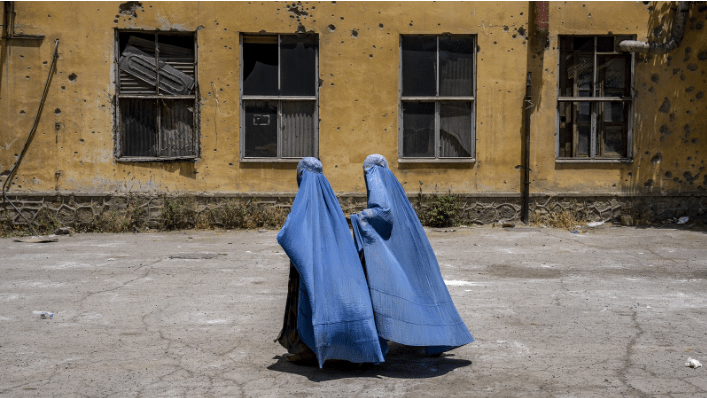
In an escalation of the Taliban’s restrictive regime in Afghanistan, the fundamentalist government introduced new laws this week further stripping women and girls of some of their most basic human rights.
With total impunity, the Taliban’s new draconian laws manage to heighten one of the most extreme examples of systematic gender-based discrimination and oppression that exists anywhere in the world.
New ‘Vice and Virtue” Laws Further Restrict Rights of Afghan Women and Girls
New ‘vice and virtue’ laws in Afghanistan further restrict the already severely limited rights of Afghanistan’s women and girls. They include stringent new rules requiring women to completely cover every inch of their bodies while in public, including their faces with veils. Additionally, a woman cannot legally speak in public, or be heard singing or reading out loud, even from within the walls of her own home.
The laws additionally prohibit a woman from looking at a man that is not a blood relative, and even go so far as to ban images of “living beings,” such as photographs, further imperiling media dissemination within and outside of Afghanistan.
How Did We Get Here?
Just over three years ago on August 15, 2021, the Taliban marched into Kabul and took control of Afghanistan and dramatically altered life in the country, particularly for women and girls. The Taliban’s takeover introduced a new fundamentalist regime that wasted no time in implementing a countrywide rollback of gender equality, erasing decades of steady progress in women’s rights.
Just two years later, more than 50 edicts and restrictions on women were put in place. One of the first orders of business was banning women and girls’ education, swiftly followed by bans barring women from working outside the home, accessing public baths, parks and gyms, and free movement around the country.Extreme modesty rules were put in place, further limiting almost every facet of women’s daily lives as the Taliban shuttered beauty salons, dismantled the Ministry of Women’s Affairs, and mandated the presence of male chaperones accompanying women anywhere outside the home.
On top of all that, Afghanistan is mired in one of the world’s worst humanitarian crises as the country continues to reel from decades of conflict and recurrent natural disasters. 1 in 4 Afghans do not know where their next meal will come from, a situation worsened by the re-emergence of polio in the country. In this context, the UN Human Rights Office has reported that domestic violence, forced marriage, human trafficking of children, and child labor have all increased.
As if that wasn’t enough to contend with, the country’s already limited civic space continues to shrink as press freedom dwindles in the aftermath of the Taliban takeover. More than half of the 547 media outlets registered in the country in 2021 have shut down, while in 2023 only 11 printed newspapers remained. Civil society organizations have been targeted with intimidation and violence, while stories about the detainment and arbitraryarrests of human rights activists proliferate. Many essential services have been reduced as skilled laborers flee the country and foreign groups abandon their investments.
What Happens Next?
Decades of conflict and political turmoil have constrained the daily lives of Afghanistan’s 41 million people — none more so than its women and girls.
As the Taliban continues to exercise control over the country, its pre-existing humanitarian crises have only been further exacerbated. The recent news of even stricter gender-based oppression and human rights restrictions will do little to ignite hopes of change anytime soon.
That’s why it’s imperative for us as global citizens to take what action we can on behalf of women and girls in Afghanistan. We’re calling on gender advocates everywhere to take a stand by raising their voices, sharing the stories of Afghan women and girls, and advocating for gender equality, everywhere.






